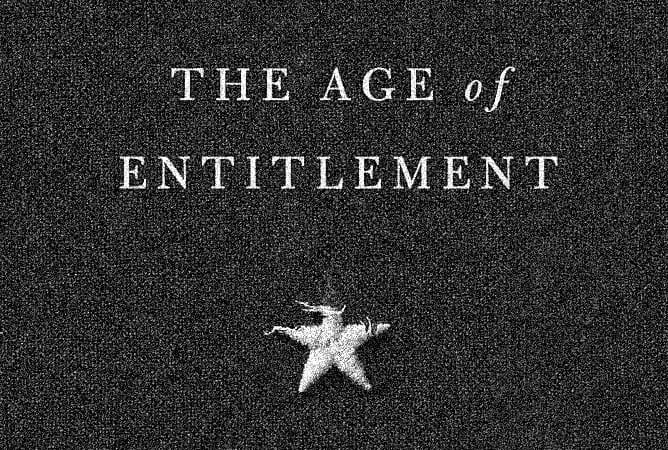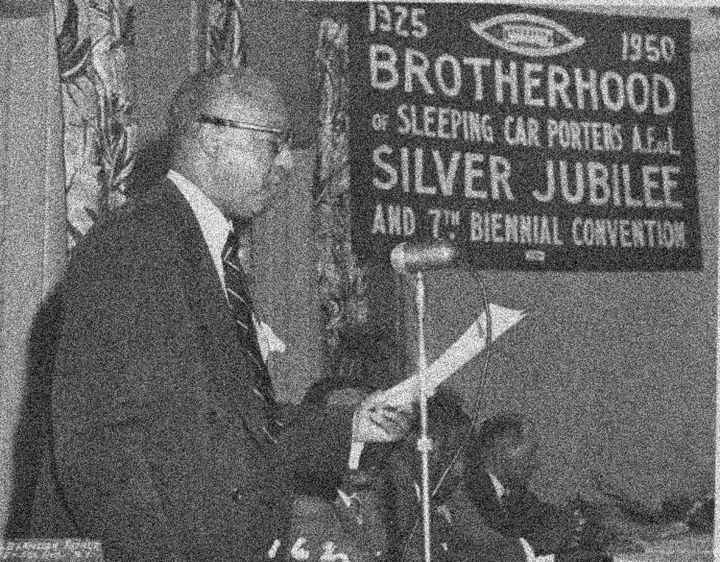“Civil Rights” as Mythical Origin
Christopher Caldwell’s origin story in The Age of Entitlement is frustrating and unconvincing, and nowhere more so than in its lack of attentiveness to the dramatic shifts in black politics in the mid-60s.

The second chapter of Christopher Caldwell’s The Age of Entitlement contains the following, jarring assertion about “civil rights.”
Costing trillions upon trillions of dollars and spanning half a century, it rivals, in terms of energy invested, the peopling of the West, the building of transcontinental railways and highways, the maintenance of a Pax Americana for half a century after World War II, or, for that matter, any of the wars the country has fought, foreign or civil.
Let’s bracket the questions of what “energy” refers to precisely and of how such significant “energy investments” could be suitably compared. The primary curiosity here is the dollar amount attached to “civil rights.” Crudely extrapolating from the 1998 budget for all civil rights enforcement across 10 different agencies, we’d only be looking at a cost of $30 or so billion spent on total civil rights law enforcement since the passage of the 1964 Civil Rights Act. I don’t have the exact numbers, but we’d be nowhere close to $1 trillion.
In order to cite this shocking number, as is revealed later in the book, Caldwell has to lump Johnson’s Great Society programs into the category of “civil rights”—thus the “trillions upon trillions” claim. In Caldwell’s view, there is good reason to do so, as Johnson’s expansion of the “welfare state to undreamed-of and undesired levels” was part of the same anti-democratic thrust as the civil rights revolution. But this connection, wherein the reader is just expected from the beginning to see Medicare under the aegis of “civil rights,” strains the imagination. And indeed, far from obvious when first introduced, it is less a carefully built argument than an assumption, part of what feels like an aggressive equivalency or interconnectivity that pervades the book: “A is bound up in the same project as B, which is ultimately the source of this other thing C, and in fact this is also related to D….” Are we talking about equivalency or causal logic? Necessary or accidental connection? Before an inquiry can be launched, we’re on to E.
Bouncing rapidly back and forth between the 60s and the present, Caldwell’s hope is to nudge the reader with every link in the chain further and further toward accepting his basic origin story: that all of the things that average Americans hate today—wokeness, anti-racism, gender ideology, endless war, and all of the elements of identitarian hierarchy—can be traced back to the unintended consequences of the Civil Rights Act of 1964, which created nothing less than an alternative constitutional order: “The changes of the 1960s, with civil rights at their core, were not just a major new element in the Constitution. They were a rival constitution, with which the original one was frequently incompatible.”
In Caldwell’s telling, the civil rights revolution led to an expansion of rights-seeking by a wide variety of minority groups and this trend continues today in the form of anti-racism, proliferating gender and sexuality expressions, diversity, equality, and inclusion commitments, etc. Again, unintended is the key rider here: the book is not against the Civil Rights Movement or the Civil Rights Act’s aims to eliminate segregation and discrimination in society, but rather against the undemocratic extension of its privileging of the rights of minority groups over that of the majority, and the resentment generating ideologies that attend such prioritization.
What’s immediately curious about Caldwell’s line of attack is that he does not engage the existing critical literature on the Civil Rights Act. Activists and legal scholars have sometimes tied themselves into knots trying to figure out whether certain provisions of the Act should apply to which groups and why, and some of the theoretical conundrums involved could indeed have bolstered Caldwell’s argument. Take law professor Ahmed White’s argument about the class politics of Title VII: “As predicted by its critics from the left—and as other critics have since acknowledged—the regime that was enacted has failed to rectify the problem of workplace inequality. Far worse, in the hands of employers, courts, and civil rights and feminist activists, Title VII has evolved in a fashion that enhances employers’ authoritarian control of the workplace while eroding the most crucial foundation of workers’ rights: solidarity. It is, in key respects, an anti-worker law.” This seems like it would make a suitable point of departure for an exploration of the concrete effects of the Civil Rights Act, but Caldwell appears much more interested in painting his vision of competing constitutional orders in very broad strokes.
Between the lack of engagement with the supporting literature, the breathless and often unelaborated equivalency demanded of the reader throughout, and the overarching desire to shoehorn all of his material into this ultimate battle between “rival constitutions,” The Age of Entitlement is a frustrating read, and nowhere more so than in its lack of attentiveness to the dramatic shifts in black politics in the mid-60s.
With the passages of the 1964 Civil Rights Act and the 1965 Voting Rights Act, the legal bases of discrimination in the United States had been eliminated. The de jure aim of the Civil Rights Movement had been achieved, and with that, many of its key leaders took it upon themselves to attempt to articulate where the movement went from there. This task was made more difficult by the appearance of regular rioting in major urban centers, which clarified the difficulty of making good on the promise of civil rights while stoking white backlash.
One path forward was to push for broad-scale economic transformation that was essentially universal in nature, and indeed, this was the path pursued by King, Randolph, Rustin, and many other core civil rights leaders. The “Freedom Budget” was the fruit of the effort to articulate this path, and as its framers asserted time and again, social transformations in housing, jobs, healthcare, etc. needed to be made for all Americans and not just particular marginalized subgroups. I wrote recently about this path here.
Another path was the turn to Black Power, community control, and what was perceived by many to be the exact kind of race essentialism that the Civil Rights Movement had attempted to overcome. Given the political-economic impasses of the mid-60s, the former path proved fruitless, but the latter pursuit, with its emphasis on small-scale experimentation and cultural transformation, has been rather successful. And indeed, it’s much easier to trace anti-racism, DEI, etc. to this latter path, which often involved a hostile rejection of the ideas and leaders that had defined civil rights. If there is a development that made “race the central concept in the country’s official self-understanding,” it was the turn away from the spirit of the Civil Rights Movement rather than its undue extension.
Remarkably, Caldwell does not so much as mention this fractious split in the Civil Rights Movement. There’s no discussion of Black Power. Neither Stokely Carmichael nor Bayard Rustin make an appearance. How are we to attribute so much to “civil rights” if the moment of its sundering as a coherent movement is not addressed? Here Caldwell might try to return to the narrower form of his argument: that it’s about the unintended consequences of the Act rather than judgment cast on the whole of the Civil Rights Movement. But he has previously defined “civil rights” so capaciously as to include Medicare, so how now would we return to argumentative and conceptual restraint?
None of this, by the way, totally invalidates Caldwell’s argument. Even if much of what he rails against in the form of DEI-speak cannot be traced to “civil rights,” even broadly conceived, his argument that undemocratic means of seeking rights and privileges were inspired by the Civil Rights Act could still hold up. But it is simply impossible for him to draw a straight line between the illiberal inanities of contemporary cultural liberalism and civil rights without even so much as recognizing the prominent, bitter split in the Civil Rights Movement in the mid-60s. Indeed, I would argue that the underlying vision of that movement was, as A. Philip Randolph and Bayard Rustin both argued, betrayed in the later 60s, and that we are still living out the effects of that betrayal.
What is most curious about Caldwell’s book is that despite its wildly paranoid style, lack of evidence, and non-engagement with the key historical episodes he would need to account for in order to successful narrate his origin story, it has been widely reviewed (and even praised in) liberal outlets, and none point to the fracturing of the Civil Rights Movement as offering a much better origin for Caldwell’s grievances than “civil rights” itself. Why? My guess is simply that liberals agree with parts of the story but wish to value it somewhat differently. In their view, the civil rights revolution did indeed lead to an expansion of rights-seeking by a wide variety of minority groups, a trend continuing today in the form of anti-racism, differing gender and sexuality expressions, diversity, equality, and inclusion commitments, etc. There might be some concerning developments here, but if you’re a liberal, this is generally a good thing, and if you’re not, it’s not. There are some particulars to quibble about, but the story’s fine, it’s just in how you tell it.
Against both Caldwell’s story and its differently-valued liberal equivalent, it is necessary to recognize and assert some differentiation here, since the contemporary ideologies Caldwell is concerned with very clearly echo post-Civil Rights Act developments in black and left politics and are difficult to see as emanating from the Platonic form of “civil rights.”
■
Benjamin Y. Fong is the author of Quick Fixes: Drugs in America from Prohibition to the 21st Century Binge (Verso, 2023) and the producer/host of Organize the Unorganized: The Rise of the CIO.



